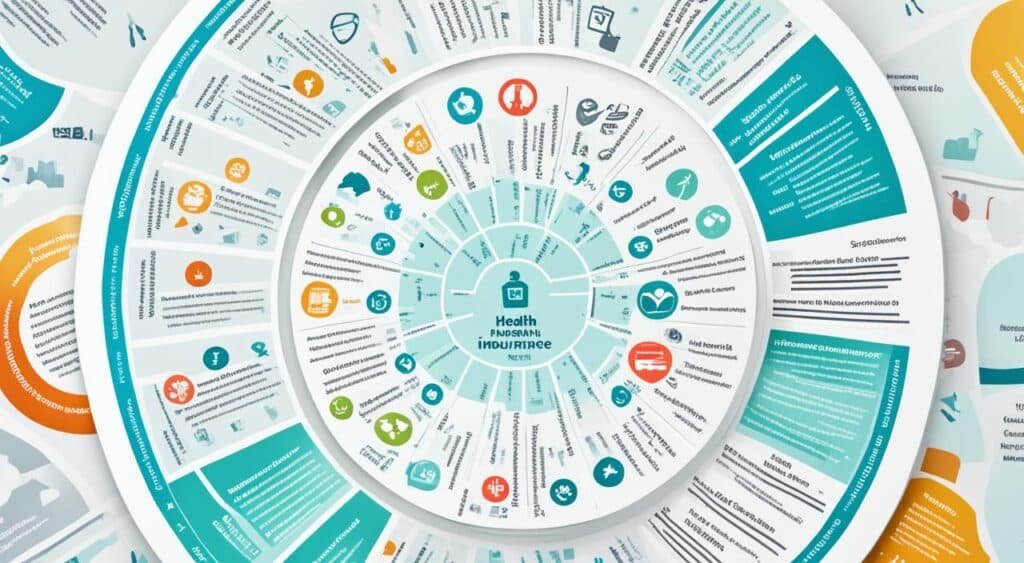Choosing the right health insurance is key to your family’s health. It should fit your needs, budget, and life stage. With little time to make this choice, rushing can lead to costly mistakes. This guide ensures you find affordable health insurance, whether from a state or federal health insurance marketplace or an employer.
First, see if health insurance is offered by your employer. If they do, you might not need to check the government marketplaces. Yet, you can look there for more options. If your employer doesn’t provide health insurance, find your state’s online marketplace. Or, check the federal one to get the best match for you.
Key Takeaways
- Choosing the right health insurance is crucial for your family’s well-being, covering your health needs, budget, and life stage.
- Determine if your employer offers health insurance or if you need to shop the state or federal health insurance marketplace.
- Evaluate different types of health insurance plans, including HMOs, PPOs, EPOs, and POS plans, to find the best fit for your family.
- Review plan summaries and provider directories to understand coverage and network options.
- Assess your family’s medical needs and choose a plan that aligns with your preferred level of flexibility and referral requirements.
Determine Health Insurance Marketplace
Finding the right health insurance starts with choosing where to look. Part of this choice is knowing if your employer offers health insurance. It affects where you’ll search.
If Employer Offers Health Insurance
If you get health insurance from work, you may not use the insurance exchanges. But, it’s smart to still check out what’s available. You might find a plan on the health insurance marketplace that’s better for you or your family’s needs and budget.
If Employer Doesn’t Offer Health Insurance
Without health insurance from work, you’ll need to look elsewhere. Explore state or federal health insurance marketplaces. They were set up by the Affordable Care Act to make finding and signing up for affordable health coverage easier.
Compare Types of Health Insurance Plans

When you look for health insurance, you’ll find different kinds. These include HMOs, PPOs, EPOs, and POS plans. Your choice of health insurance plan affects how much you pay and the doctors you can visit.
HMO – Health Maintenance Organization
HMOs offer lower monthly costs. But, you must see in-network providers and get a referral to see a specialist. This approach helps in managing your care better.
PPO – Preferred Provider Organization
PPOs have higher monthly fees. They let you choose any doctor or health care provider, inside or outside the network, without a referral. Yet, seeing out-of-network providers is costlier.
EPO – Exclusive Provider Organization
EPOs act like HMOs but without the need for specialist referrals. You must, however, see in-network providers for coverage. They often cost less each month than PPOs.
POS – Point of Service Plan
POS plans are a mix of HMOs and PPOs. You need a referral to see a specialist. Out-of-network care is available but more expensive. These plans usually cost less per month than PPOs.
| Plan Type | In-Network Requirement | Referral Requirement | Out-of-Pocket Costs |
|---|---|---|---|
| HMO | Must use in-network providers | Referrals required to see specialists | Lower monthly premiums, but higher out-of-pocket costs for out-of-network care |
| PPO | Can use in- or out-of-network providers | No referrals required | Higher monthly premiums, but lower out-of-pocket costs for out-of-network care |
| EPO | Must use in-network providers | No referrals required | Lower monthly premiums than PPOs, but higher out-of-pocket costs for out-of-network care |
| POS | Can use in- or out-of-network providers | Referrals required to see specialists | Lower monthly premiums than PPOs, but higher out-of-pocket costs for out-of-network care |
Understanding the differences in health insurance plans helps pick what fits your family’s needs and wallet best.
Review Plan Summaries and Directories

When you check out health insurance plans, looking at their summaries and directories is key. You’ll get to know what they cover and where you can get care. Online health insurance marketplaces usually link to the summary of benefits. This shows the plan’s costs and what it covers. It makes comparing insurance plans simple and helps you choose wisely.
A provider directory shows which doctors and places are in the plan’s network. Knowing this helps see if your favorite healthcare providers are covered. If you get insurance through work, ask your benefits person for summaries of the insurance plans they offer.
| Key Considerations | Details |
|---|---|
| Summary of Benefits | Outlines plan costs and covered health benefits |
| Provider Directory | Lists in-network doctors, hospitals, and clinics |
| Employer-provided Plans | Ask your benefits administrator for plan summaries |
Don’t overlook the importance of looking through summaries and directories. It’s crucial for weighing health insurance plans. This way, you can pick the right one for your family’s health benefits and medical needs.
Assess Family’s Medical Needs

Choosing the right health insurance involves looking at your family’s health needs and history. Think about past treatments to figure out the coverage you should get. This helps match your health benefit needs with what you can afford.
Plans Requiring Referrals
HMOs and POS plans need you to see your primary care doctor first. This is before you can schedule a procedure or visit a specialist. While it limits who you can see, it keeps your medical team up to date on your health.
Plans Without Referral Requirements
PPO and EPO plans let you visit specialists without a referral from your primary doctor. This is ideal if you prefer to have more control over your healthcare choices. However, it often means you might pay more out of pocket.
HDHPs with Health Savings Accounts
For those wanting to keep control of their health needs and health benefit budgets, HDHPs with HSAs can be a good fit. These plans have lower monthly costs but higher deductibles. You can save on taxes with money put into an HSA.
Evaluate Provider Networks
A health insurance network includes the doctors and facilities your plan works with. Costs are lower when you choose an in-network doctor. This is because in-network doctors have agreed to lower rates. Make sure your preferred doctors are in the lists of providers for the health insurance plans you’re checking out.
Importance of Network Size
If you haven’t picked a favorite doctor yet, a larger network matters. This is especially true if you live in a place like a rural area. A big provider network offers more local doctors who are part of your health plan. This means more health insurance plans will be available to you, ensuring you have choices nearby.
Preferred Doctors in Network
When looking at insurance plans, make sure your preferred doctors are in the network. Choosing out-of-network doctors can be costly. So, it’s vital to choose a plan that lets you keep seeing your favorite doctors.
Compare Out-of-Pocket Costs
When picking a health insurance plan, look at the out-of-pocket costs too. It’s key to know important terms. This helps make a smart choice:
Key Health Insurance Terms
- Deductible: The amount you pay for covered healthcare services before your insurance plan kicks in.
- Copay: It’s a fixed dollar amount for things like doctor visits or prescriptions.
- Coinsurance: Your share of the costs for covered care, after the deductible is paid.
- Out-of-Pocket Maximum: The most you’ll pay in a year for covered services before your plan covers it all.
Higher Premiums vs. Lower Out-of-Pocket
Plans with high monthly premiums often mean lower out-of-pocket expenses. This includes less for deductibles, copays, and coinsurance. They could be great if you use health services a lot or expect big health costs this year.
Lower Premiums vs. Higher Out-of-Pocket
On the flip side, cheaper monthly premium plans might cost more when you need care. This is because their deductibles, copays, and coinsurance are higher. They suit those with less expected health needs who want to save money monthly, even if emergency costs more.
health insurance Benefits and Coverage

Choosing a health insurance plan means considering what benefits and coverage it offers. Plans on the marketplace cover certain essential health needs by law. This ensures your family gets the care they need.
Essential Health Benefits
The Affordable Care Act requires health plans to include key services. These include doctor visits, hospital stays, and prescriptions. Also, there’s help for mental health, maternity, and more. This means plans must offer basic services for your health.
Metal Levels – Bronze, Silver, Gold, Platinum
Health plans come in different ‘metal levels’ like bronze or platinum. Each level measures how much the plan pays for your healthcare. Bronze plans pay less (60%), while platinum covers more (90%). Picking a higher level means less cost when you use your plan, but a higher monthly fee.
Catastrophic Plans
For those under 30 or with a hardship, there are catastrophic plans. They offer limited coverage and have high deductibles. But, they protect you from big medical bills in emergencies. They might be a good fit for those mainly focused on worst-case situations, and consider themselves healthy.
Also read: Navigating Auto Insurance for Electric Vehicles: What’s Different?
Understand Plan Types and Networks
Choosing a health insurance plan means knowing about different types and the doctors you can see. You’ll find HMOs, PPOs, EPOs, and POS plans out there. Each has its own way of working.
HMO, PPO, EPO, POS Plans
HMOs have a smaller group of doctors you can see. You’ll need to stick with these doctors for your care. PPOs, on the other hand, let you see doctors outside the main group, but it costs more. EPOs are in the middle, with select doctors you can visit. Outside these, you’ll pay full price. POS plans act like a mix of HMOs and PPOs, giving you out-of-network options but at a cost.
Provider Network Considerations
The size and setup of the doctor network are key when picking a plan. A bigger network means more choices, good especially in remote areas. If there are doctors you really want to see, check if they’re in the plan. This and the network size can affect your costs and care quality a lot.
FAQs
Q: How do I choose the right health insurance plan for my family?
A: To choose the right health insurance plan for your family, consider factors such as your health needs, budget, and preferred network of healthcare providers. You can compare plans based on coverage, premiums, deductibles, and out-of-pocket costs.
Q: What is the Affordable Care Act (ACA) and how does it affect my health insurance options?
A: The Affordable Care Act (ACA) is a federal law that aims to increase the quality and affordability of health insurance. It provides guidelines on essential health benefits that must be covered by insurance plans and offers subsidies to make coverage more affordable for individuals and families.
Q: When should I enroll in a health insurance plan?
A: You can typically enroll in a health insurance plan during the open enrollment period, which is usually towards the end of the year. If you experience a qualifying life event, such as getting married or having a baby, you may also be eligible for a special enrollment period.
Q: What are the different types of health insurance plans available?
A: Health insurance plans can vary in terms of coverage and cost. Common types include HMOs (Health Maintenance Organizations), PPOs (Preferred Provider Organizations), EPOs (Exclusive Provider Organizations), and POS (Point of Service) plans. Each type has its own network of providers and rules for coverage.
Q: Can I get health insurance through my employer?
A: Many employers offer group health insurance plans to their employees as part of their benefits package. These plans may provide coverage for individuals and families at a lower cost than individual plans purchased on the market.
Q: What is the difference between Medicare and Medicaid?
A: Medicare is a federal health insurance program primarily for individuals aged 65 and older, while Medicaid is a state and federally funded program that provides health coverage to low-income individuals and families. Eligibility for each program is based on specific criteria.
Q: How do I know if I qualify for Medicaid?
A: Eligibility for Medicaid is determined based on factors such as income, family size, and state-specific requirements. You can check with your state’s Medicaid program or healthcare marketplace to see if you qualify for coverage.
Source Links
- https://www.healthcare.gov/choose-a-plan/comparing-plans/
- https://www.nerdwallet.com/article/health/choose-health-insurance
- https://www.marylandhealthconnection.gov/health-coverage/choose-a-plan/





